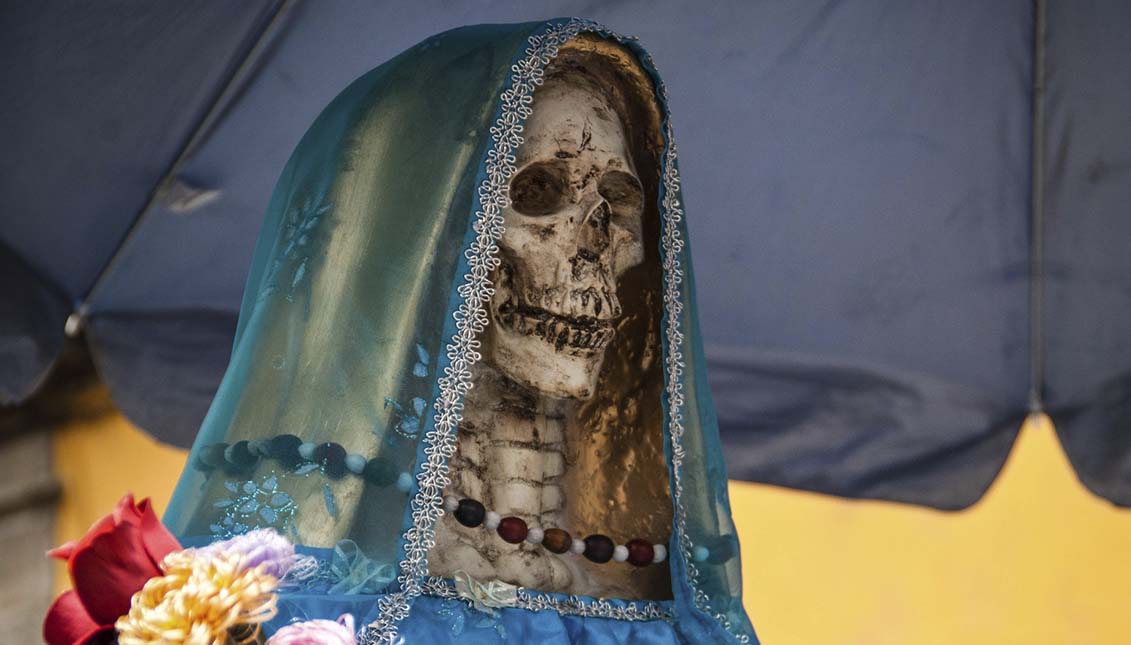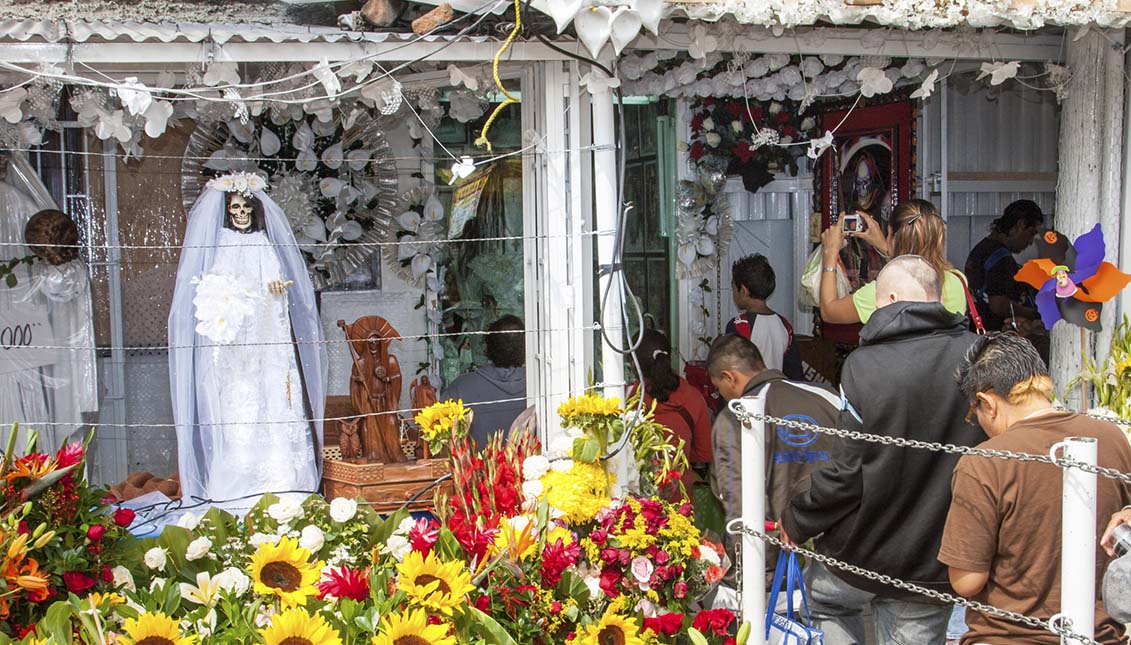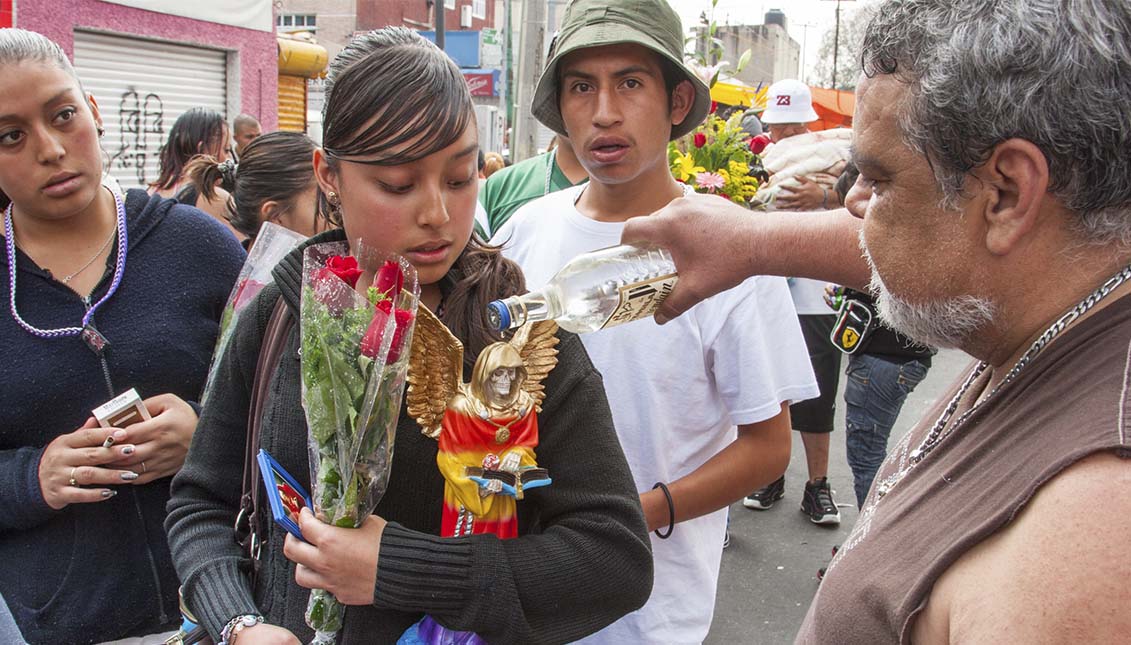
Santa Muerte: The miraculous pagan divinity who doesn’t snub anyone
Punished by the Mexican government and the Catholic Church, Santa Muerte gains followers all over the world, and not only narcos.
Called by plenty of names –Niña Blanca, La Huesuda, La Dama Poderosa or La Flaquita- Santa Muerte has become one of the most honored and prayed Mexican popular saints in little more than twenty years.
Nowadays, candles, statues, and Botanics of La Flaquita are sold not only at Mexican “yerberías”, but even at supermarkets in the U.S., despite its worship being harassed by the Catholic Church and the Mexican government.
The Virginia Commonwealth University professor Andrew Chesnut is one of the major experts on Latin-American religions. While he was doing research about the Virgin of Guadalupe, Mexico patron saint, in 2009, the shape of a skeleton covered with a mantle appeared on his computer.
“It fascinated me that forty altars were destroyed by the Mexican army in the regions bordering the U.S. Why was Santa Muerte such a threat for the Mexican government to send their troops? I was so intrigued that changed the topic of my research,” says.

Despite the fact that there's no official census, Chesnut estimates Santa Muerte adepts are among 12 million, being the religious cult that has raised the more in the last two decades. And it is mainly popular among young people who do prefer her over other iconic Mexican saints such as San Judas Tadeo.
“In the beginning, her followers honored her at their homes clandestinely. Until it was a poor woman called Enriqueta Vargas, a quesadillas seller in Tepito, a dangerous neighborhood in Mexico City, the one who celebrated the first public ceremony in 2001, the night previous to All Saints Day. And this key event got space for her devotees not to hide anymore,” states the professor.
A saint born in Mexican land, “a bastard as we are,'' explained a Street vendor to Chesnut, who has spent a decade on researching the phenomenon of Santa Muerte further than its narco saint link. Collecting the testimony from her devotionals who pray on her due to the promptness and variety of her miracles. Some of them are left-handed, but many more requests are from good.
"She was in the middle of a fight between gangs when one man approached and tried to stab her. Then La Niña Blanca appeared and pushed her back."
“There are seven color candles and each one focuses on a kind of request; people who are involved in crime ask for revenge, earning more money or removing the police. However La Flaquita is also seen as an avenger and she is the prison system patron saint, so as among her adepts there are policemen, attorneys, and prison guards. My nephew, who is a guard in Michoacan Federal Prison, told me that almost a quarter of his work colleagues are Santa Muerte devotees,” resumes the researcher.
In his book “Devoted to Death: Santa Muerte, the Skeleton Saint”, Andrew Chesnut mentions one of his conversations with a Young ex-gangster who revealed to him that Santa Muerte saved her life:
“The Young girl, who wasn’t more than 19, assured me that once she was in the middle of a fight between gangs when one man approached and tried to stab her. Then La Niña Blanca appeared and pushed her back. There are many similar stories related to the terrible murders wave in Mexico; more than 20000 people died due to the drug war in just ten years. The only country who exceeds is Syria.”

Devotional roots to La Huesuda are as old as the relationship between the Mexican and Death: companion more than a threat, master and no hangman. There were others and not her who raised their axes. And they go on…
“After Europe was devastated by the Black Death, in the XIV century, Spanish conquerors arrived in Latin-American and brought the Parca, who was a simple symbol of death for. Indigenous people had their own gods of death and they were represented as skeletons. For that reason, natives associated La Parca to their divinities and became it a supernatural being who Works miracles”, assures Andrew Chesnut.
“The first report we have about the cult on death was at the time of Spanish Inquisition, when there were rumors about some native people was honoring a skeleton. The inquisitor went to Querétaro, arrested them and burn the altar.”
“Due to the violent situation in Mexico, most people don’t want to end shot in the Street like dogs. The Saint, who is life and death control with her iconic sand timer, grants it."
Politicians, celebrities, and intellectuals prayed secretly to la Dama Poderosa for many years, so as the poor people did. It was thought by some people that Santa Muerte was associated to the Virgin of Guadalupe; others, because of the Catholic church power in Mexico –“It is the second biggest Church in Latin-America after Brazil and has an enormous political influence”, says-, become La Flaca into Christ's envoy and add crosses and Christian symbols into the altars.
However, the Vatican depicted the cult as “satanic”, and even bishop from Aguas Calientes has recently prohibited to bring the saint’s effigies onto the Streets on Day of All Saints. But, why?
RELATED CONTENT
“Catholics conceive Death as the antithesis of eternal life. Two years after the creation of the first churches on Santa Muerte, the government illegalized the cult. Nowadays, David Romo, one of their major famous drivers is serving a 66 years sentence accused of kidnapping old people.”

Moved by the tough conditions in their countries, hundreds of thousands of migrants from Latin American risk their lives trying to cross to the neighboring countries.
Travelers’ patron saint, the faith in the miraculous saint who doesn’t mow lives, but obstacles, has raised among those who are desperate for a piece of the American dream. She is also the undocumented migrants’ patron too.
Although it could sound strange, the Angel of Death is widely prayed for a long life:
“Due to the violent situation in Mexico, most people don’t want to end shot in the Street like dogs. The Saint, who is life and death control with her iconic sand timer, grants it. That’s why they give her presents or “mandas”, such as tobacco, alcohol or flowers… And it would be better they fulfill their part of the contract, because La Niña Blanca is very spiteful, and it is said that there can be mortal consequences,” says the professor.
Devotion, by all accounts, has crossed borders luckier than the poor migrants…
The city of Los Angeles is the Mecca of Santa Muerte in the U.S., the second country in number of La Flaquita’s devotees after Mexico-, who are not only Chicano but white people and Afro-Americans as well.
“It is ironic that there is more religious freedom in the U.S. than in Mexico or Cuba, and thanks to the Internet there have been created tones of Facebook pages and forums for English speakers. There are devotees in Europe as well, in countries like Spain, for example. And because of this diversity visions on Santa Muerte are as wide as their followers,” he concludes.
While her miracles are worth for both the poor and the rich, the narco and the sick, the prisoner and the justice of the peace, the politician and the migrant, the white girl will be like death itself, pure democracy.











LEAVE A COMMENT:
Join the discussion! Leave a comment.